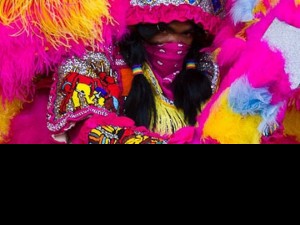glenross-lead540.jpg

As a child I remember begging my mother to take us to Super Sunday. She was reluctant, because at her age she had seen it all. Thankfully my cousin, Anitra, had not. With my mother’s permission, Anitra drove my brother and me from the quiet West Bank to the thumping heart of New Orleans. After parking on the corner of Esplanade and North Claiborne we set foot in the middle of the party. From there I went on to see things not before seen in my wildest imagination.
Gold toothed liquor salesmen dragging coolers screaming, “Ice cold! Ice COLD!” Big headed pit bulls paraded the sidewalks with chains for leashes. Little pretty babies fast asleep in their strollers pushed by mothers dancing in the streets. We stood eagerly under the bride shrouded in a mist of BBQ smoke. The air filled with the sounds of Frankie Beverly and Maze. Just as the crowd came to thicken around us they appeared. With a mystique only this city can muster, The Mardi Gras Indians had come out of hiding.
Drenched in hues so bright it should be a cardinal sin to miss. They wore colors that flushed the senses, from crimson to turquoise to salmon. These men hopped up and down the street screaming chants to the heavens. It was unlike anything I had ever seen. When I asked my cousin if we could come back next Sunday she shook her head and smiled. She told me this was something special. This was Super Sunday.
Unlike its more secluded cousin, St. Joseph Night the private gathering of Mardi Gras Indians throughout New Orleans. Super Sunday is about reconnection within the community. It gives all of the city's neighborhoods the opportunity to gather in one location to celebrate. Often shrouded in mystery there’s not only one Super Sunday but three - Uptown, Downtown and West Bank Super Sundays.
This event has been passed down, generation to generation, since the 18th century. Enslaved Africans freed from their labor on Sundays would congregate in what we now call Congo Square. The assembled slaves would often show off their tribal dances and instruments. Though slavery has long been abolished, these celebrations of expressive freedom carry on. Mr. Donald Harrison Jr, Big Chief of The Congo Nation Afro-New Orleans Cultural Group says its existence “Keeps alive ties to ancient traditions and is influential to the culture of New Orleans.”
Which traditions, you ask. The ones where the black folks dress up like Indians? Let me ask you this. Can you imagine a Super Sunday without Mardi Gras Indians? While tribes dressing up as Native Americans may sound a bit on the fray of political correctness, these costumes play a significant role to the spirit of the native New Orleanian.
“Masking gives a sense of pride to a group of people who have traditionally been downtrodden” Harrison says. Paying tribute to their ancestors while simultaneously acknowledging the original owners of this land: the Native Americans, only makes sense. The bond these two races share? Mr. Harrison goes on to say that masking pays homage to the legacy of Native Americans who helped Africans escape the tyranny of slavery. Transferring the passion from suppression to expression, Super Sunday grows larger and brighter every year.
This year’s Uptown Super Sunday will be on March 17th, 2013 at A.L. Davis Park for noon. We hope you join us with tempered respect for tradition and fervent hearts for life.



















